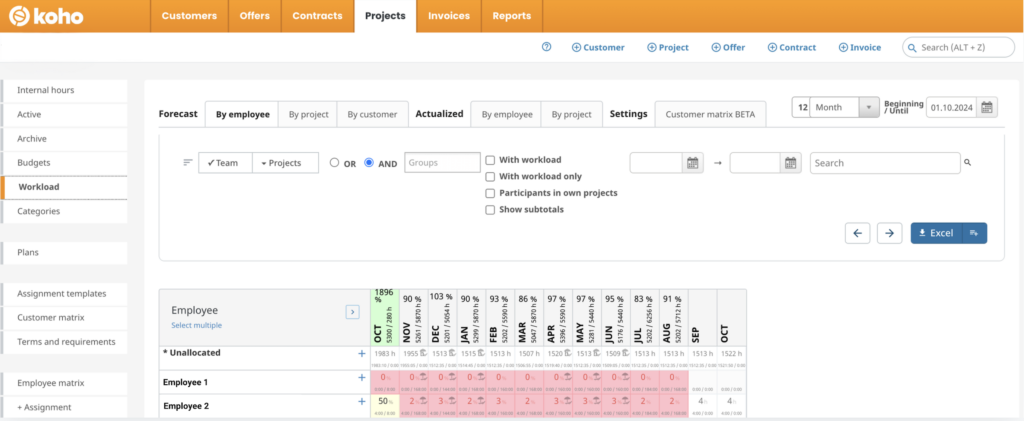AI in business: How artificial intelligence enhances the future of PSA software?


Professional Services Automation (PSA) software are a vital tool for many accounting businesses seeking to streamline operations, but what does the future hold? Technology is advancing rapidly, and AI’s role in these software continues to grow. In the future, AI will create new ways to optimize processes and free accountants from administrative tasks, enabling them to focus on higher-value work, such as advisory services. However, even at present, many software provide a wealth of automations to streamline routine tasks, yet many companies still underutilize these capabilities.
We recently attended the Ekonomi & Företag fair in Stockholm and asked participants about their expectations for future PSA software. The response was clear: they want more AI. But what could this mean in practice? Let’s explore this topic with concrete examples.
AI guides decision-making process
In the future, AI will be capable of analyzing vast amounts of data, making informed decision-making easier and faster. Detecting hidden trends or anomalies in data can provide businesses with valuable insights to support decisions. AI could be used for data analysis in situations such as:
📈 Analyzing financial trends:
PSA software often allow businesses to view various reports on their financial status. AI could enhance the analysis of these reports by quickly identifying anomalies, such as unexpected changes in revenue. This information is crucial for a company to respond to issues and take corrective actions in time.
💰 Optimizing pricing strategies:
AI can play an interesting role in pricing by analyzing both a company’s sales data and competitor pricing to provide recommendations for price optimization. Additionally, customer profitability reports already offer valuable information for optimizing pricing. Through these reports, accounting firms can easily see which clients are most profitable and whether certain contracts need adjustments.
Read more: Improve your accounting firm’s profitability with these two reports
👥 Forecasting and optimizing resource usage:
To ensure effective resourcing, AI could be utilized to analyze employee tasks and the time spent on them. Based on this analysis, AI could suggest ways to optimize resource allocation. For example, AI could recommend how to allocate employees’ time more efficiently across different projects to maximize productivity. This information could also be used within an organization to evaluate staffing or additional training needs.


AI supports decision-making by leveraging both real-time and historical data, improving forecast accuracy and reducing risks. Businesses can use these forecasts in strategic planning, allowing them to respond more quickly to market changes.
Automation reduces routine tasks
AI in business reduces the amount of manual work. Many processes, such as accounting or invoicing, can be automated using AI, saving both time and resources. For example, AI could simplify invoicing by verifying invoicing information and sending reminders to customers for overdue payments. Currently, invoicing processes can already be significantly accelerated through automation, and it’s well worth taking a closer look at the automation features offered by PSA software.
AI also simplifies the work of accountants in many ways. For example, the Finnish Association of Accounting Firms (Taloushallintoliitto) has already tested AI’s competence in accounting, taxation, and labor law questions – with relative success! According to their report (only in Finnish, unfortunately), AI can be used to enhance quality control in accounting, as it helps identify recurring errors and ambiguous issues that need further inspection.
From an accounting firm’s perspective, automation enabled by AI could revolutionize the nature of work in the future. Routine and time-consuming tasks, such as bookkeeping, report compilation, and accounts receivable management, can be handled quickly and accurately by AI. As a result, accountants have more time to support clients’ business and provide consultancy, which adds value to customers.
Read more: Customer-centricity in accounting services – what does it mean?
Looking ahead
In the future, we can expect an even closer connection between AI and business software, enabling these software to learn and adapt more precisely to business needs. As a result, processes will become smoother, more predictable, and more cost-efficient.
AI will not entirely replace human work—not now, and probably not in the future either. Instead, it will free up time for companies to focus on strategic work and help make better decisions, enhancing satisfaction for both employees and customers.
Would you like to automate your business processes? Schedule a free demo to see how Koho PSA minimizes routine work and gives you more time to focus on business development.


Would you like to have a better look?
Request a free demo!
Book a free demo, no strings attached, and let Koho PSA convince you. You can save up to 87 % in invoicing with Koho PSA. The demo will give you a better view on how Koho PSA will help your accounting company succeed.